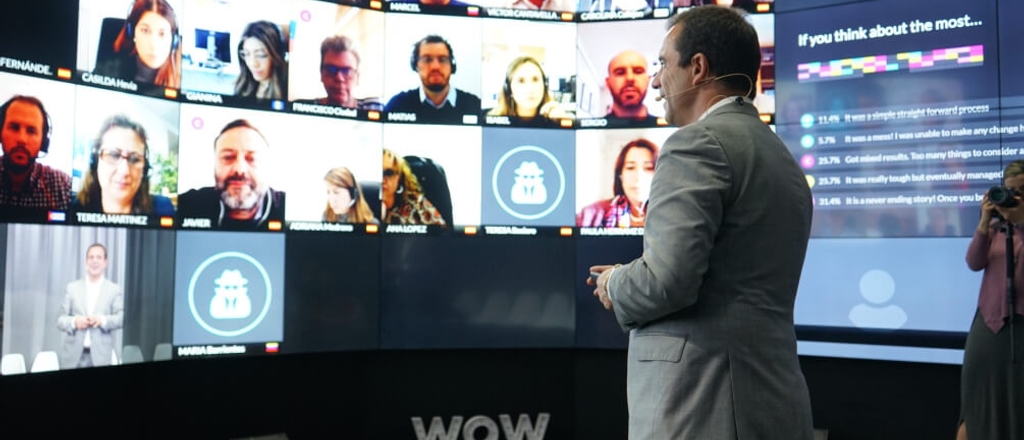- Home
- News And Events
- News
- Ie University Opens Online Training Hub In Response To Covid-19
IE University Opens Online Training Hub in Response to COVID-19

IE University will provide open access to online training in response to the health emergency around the world. The academic institution’s newly launched Building Resilience is a new online hub with courses, webinars, conference series, articles, expert videos, and multimedia materials, that helps users understand and prepare for the world in which we will live following the coronavirus pandemic.
As part of Building Resilience, IE University faculty and experts will analyze the post-pandemic challenges from macroeconomic, financial, technological, and social perspectives. Key topics include global governance, new leadership, globalization, the future of education, the new business reality, telework, the impact on urban management, and healthcare. Universities around the world will have free access to 36 online courses designed by IE University and published by Coursera, which focus on Technology, Marketing, Branding, Customer Experience, and LegalTech, among others.
Among the next events planned for the Building Resilience hub, experts from around the world will convene in the Virtual Summit – Paving the road to recovery (April 1-3) to address issues such as the response of governments to the global health crisis, leadership in complex times, the digital transformation prior COVID-19, the keys to economic recovery, the redefinition of talent, and the new capitalism.
The summit will include Santiago Iñiguez de Onzoño, Executive President of IE University; Susana Malcorra, Dean of IE School of Global & Public Affairs, former Secretary General of the United Nations and former Minister of the Argentine Government; Nick Van Dam, Chief Learning Officer at IE University; Rebecca Henderson, economist and professor at Harvard Business School; Rebeca Grynspan, General Secretary of SEGIB; Rafael Bengoa, former Director of WHO Health Systems; Peter May, Chief Talent Officer of Baker & McKenzie; Matthew Smith, Chief Learning Officer at McKinsey; Andrew Hill, Financial Times Management Editor; Michael Skapinker, columnist for the Financial Times and Executive Editor of Headspring; Rory Simpson, Chief Executive Learning Officer of Telefonica; and Laurent Choain, Chief Learning Officer of Mazars, among other experts.
UN 2030 AGENDA
“With more than 3,000 million people currently confined to their homes, IE University contributes to the diffusion of valuable ideas in times of difficult access to conventional forms of education. We join UNESCO’s message, in line with the Sustainable Development Goals of the United Nations 2030 Agenda, in that we must work together to guarantee access to lifelong education so that no one is left behind,” said Santiago Iñiguez de Onzoño, President of IE University. “The COVID-19 pandemic poses an unprecedented challenge for education, one that affects more than 1,200 million students and that has a direct impact on the business community.”
In a historical moment in which access to education is limited, IE University will share its 20 years of experience in online training. IE University was a pioneer in Europe two decades ago when it launched the first online programs and is considered by the Financial Times as the 2nd university in the world in the 2020 Online MBA Ranking.
“Our experience, interactive solutions, and our knowledge are now available for other academic institutions to counter these difficult times and to use education as a transformative tool for society.”
“Over the past 20 years, we have tested many platforms and have developed sophisticated online training methodologies – for example, our WOW Room brings students together to learn in an immersive environment that replicates classroom training. Our experience, interactive solutions, and our knowledge are now available for other academic institutions to counter these difficult times and to use education as a transformative tool for society,” commented Santiago Íñiguez de Onzoño.
Building Resilience also includes information about entrepreneurial projects developed by IE University students, alumni, and professors that address the COVID-19 crisis – from tech platforms used to confirm or rule out symptoms, geolocation heat maps of patients that can help predict the pandemic’s evolution, 3D printing of hospital masks, and support services for vulnerable groups.
“We are convinced that this critical situation will soon pass. In the meantime, we must do our best to support the authorities and contribute to improved crisis management by providing quick and inspiring solutions,” concluded Santiago Íñiguez de Onzoño.